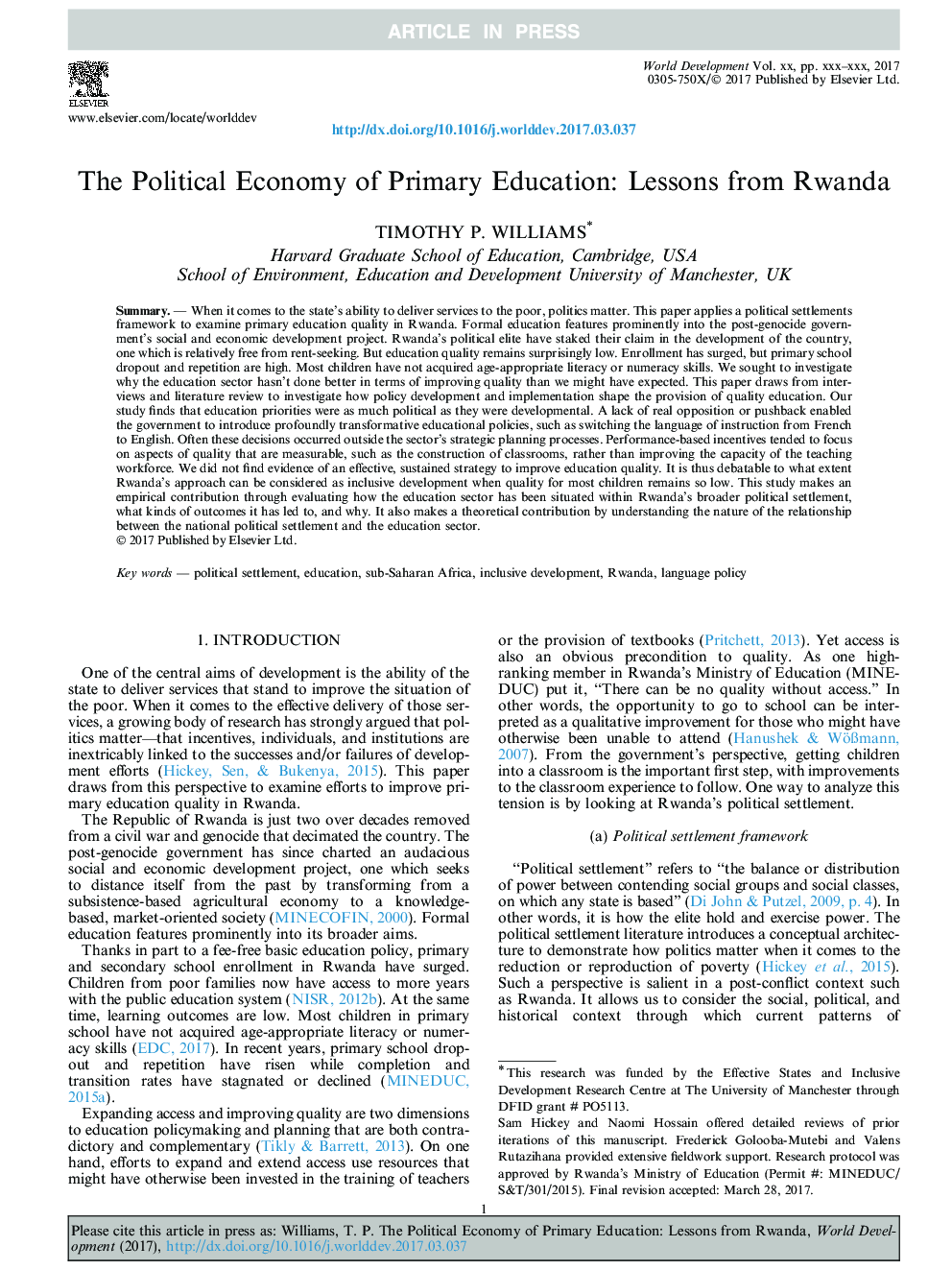| کد مقاله | کد نشریه | سال انتشار | مقاله انگلیسی | نسخه تمام متن |
|---|---|---|---|---|
| 5105079 | 1481122 | 2017 | 12 صفحه PDF | دانلود رایگان |
عنوان انگلیسی مقاله ISI
The Political Economy of Primary Education: Lessons from Rwanda
ترجمه فارسی عنوان
اقتصاد سیاسی ابتدایی: درس های رواندا
دانلود مقاله + سفارش ترجمه
دانلود مقاله ISI انگلیسی
رایگان برای ایرانیان
کلمات کلیدی
حل سیاسی تحصیلات، جنوب صحرای آفریقا، توسعه فراگیر، رواندا، سیاست زبان،
ترجمه چکیده
وقتی که به توانایی دولت برای ارائه خدمات به فقرا می رسد، سیاست مهم است. این مقاله یک چارچوب اساسی سیاسی برای بررسی کیفیت آموزش ابتدایی در رواندا است. آموزش رسمی به وضوح به پروژه توسعه اجتماعی و اقتصادی دولت پس از نسل کشی اختصاص دارد. نخبگان سیاسی رواندا ادعای خود را در توسعه کشور متمرکز کرده اند، که نسبتا رایگان از جستجوی اجاره است. اما کیفیت تحصیلات شگفت انگیزی پایین است. ثبت نام افزایش یافته است، اما ترک تحصیلات تکمیلی و تکرار زیاد است. اکثر کودکان مهارت سوادآموزی و مهارت های حسابداری مناسب را ندارند. ما سعی کردیم به بررسی اینکه چرا بخش آموزش و پرورش در بهبود کیفیت بهتر از چیزی که ما انتظار داشتیم، بهتر نیست. این مقاله از مصاحبه ها و بررسی ادبیات برای بررسی چگونگی ایجاد و اجرای سیاست های آموزش و پرورش با کیفیت ارائه می شود. تحقیقات ما نشان می دهد که اولویت های آموزش و پرورش همان اندازه سیاسی بودند که توسعه یافتند. فقدان مخالفت یا فشار واقعی، دولت را مجبور کرد سیاست های آموزشی تعاملی را تغییر دهد، مانند تعویض زبان آموزش از فرانسه به انگلیسی. اغلب این تصمیمات در خارج از فرایندهای برنامه ریزی استراتژیک بخش رخ داده است. انگیزه های مبتنی بر عملکرد، به جای ارتقای ظرفیت نیروی کار آموزشی، بر جنبه های کیفی قابل اندازه گیری، مانند ساخت کلاس های درس تمرکز کرده اند. ما شواهدی از استراتژی مؤثر و پایدار برای بهبود کیفیت آموزش را پیدا نکرده ایم. بنابراین، قابل بحث است که تا چه حد رویکرد رواندا می تواند به عنوان توسعه فراگیر مورد توجه قرار گیرد، زمانی که کیفیت برای اکثر کودکان باقی مانده است. این مطالعه یک تجربه تجربی را از طریق ارزیابی اینکه چگونه بخش آموزش و پرورش در حل و فصل سیاسی وسیع تر رواندا قرار گرفته است، چه نتایجی را به دنبال داشته است و چرا. همچنین با درک ماهیت رابطه بین حل و فصل سیاست ملی و بخش آموزش، سهم نظری را به همراه دارد.
موضوعات مرتبط
علوم انسانی و اجتماعی
اقتصاد، اقتصادسنجی و امور مالی
اقتصاد و اقتصادسنجی
چکیده انگلیسی
When it comes to the state's ability to deliver services to the poor, politics matter. This paper applies a political settlements framework to examine primary education quality in Rwanda. Formal education features prominently into the post-genocide government's social and economic development project. Rwanda's political elite have staked their claim in the development of the country, one which is relatively free from rent-seeking. But education quality remains surprisingly low. Enrollment has surged, but primary school dropout and repetition are high. Most children have not acquired age-appropriate literacy or numeracy skills. We sought to investigate why the education sector hasn't done better in terms of improving quality than we might have expected. This paper draws from interviews and literature review to investigate how policy development and implementation shape the provision of quality education. Our study finds that education priorities were as much political as they were developmental. A lack of real opposition or pushback enabled the government to introduce profoundly transformative educational policies, such as switching the language of instruction from French to English. Often these decisions occurred outside the sector's strategic planning processes. Performance-based incentives tended to focus on aspects of quality that are measurable, such as the construction of classrooms, rather than improving the capacity of the teaching workforce. We did not find evidence of an effective, sustained strategy to improve education quality. It is thus debatable to what extent Rwanda's approach can be considered as inclusive development when quality for most children remains so low. This study makes an empirical contribution through evaluating how the education sector has been situated within Rwanda's broader political settlement, what kinds of outcomes it has led to, and why. It also makes a theoretical contribution by understanding the nature of the relationship between the national political settlement and the education sector.
ناشر
Database: Elsevier - ScienceDirect (ساینس دایرکت)
Journal: World Development - Volume 96, August 2017, Pages 550-561
Journal: World Development - Volume 96, August 2017, Pages 550-561
نویسندگان
Timothy P. Williams,
